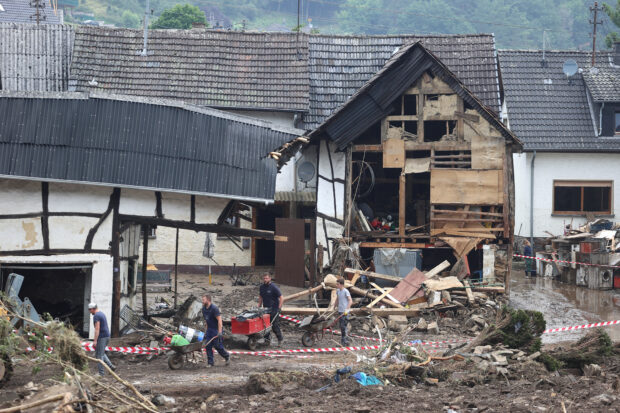Quakes and storms cause $95B in insurance losses in 2023 -Munich Re

Residents remove rubble among the debris left over by the July 2021 extreme weather and lethal floods of the nearby Ahr river, in Schuld, Germany, July 17, 2021. REUTERS/Wolfgang Rattay
MUNICH – Earthquakes in Turkey and Syria, storms in the United States and other natural disasters caused an estimated $95 billion in insured losses in 2023, down from the previous year but still above the long-term average, Munich Re said on Tuesday.
The tally of losses from natural catastrophes covered by insurance is less than the $125 billion recorded in 2022 and is also lower than an estimate of $100 billion published last month by rival Swiss Re.
But the 2023 figure from Munich Re, the world’s largest reinsurer, is above a 10-year average of $90 billion and well above a 30-year average of $57 billion.
The quakes in Turkey and Syria were the most destructive events, causing 58,000 deaths, $50 billion in overall losses and $5.5 billion losses covered by insurance.
READ: Explainer: Why was the Turkey-Syria earthquake so bad?
Article continues after this advertisementBut what stood out in 2023, Munich Re said, were not single big events but the numerous severe regional storms in the United States and Europe that are increasing as a result of climate change.
Article continues after this advertisement“The background noise has become louder. Loss events that were previously regarded as secondary and acknowledged as less significant ‘side risks’ have become a major loss driver,” Ernst Rauch, chief climate scientist at Munich Re, told Reuters.
Total losses from natural catastrophes, including those not covered by insurance, were $250 billion in 2023. That is similar to 2022 and the average of the previous five years, but above 10-year and 30-year trends.
READ: Natural disasters caused $313 billion economic loss in 2022 – Aon
North America once again accounted for a big portion of the losses, though the hurricane season was relatively mild.
Scientists have said that a warming of the Earth’s atmosphere will cause more damage in the decades ahead.
Insurers have in some cases been raising the rates they charge as a result of the increasing likelihood of disasters, and in some places have stopped providing coverage.